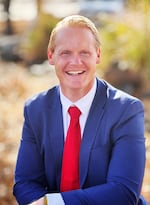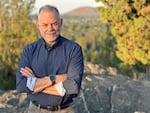Editor’s note: Election Day is Tuesday, Nov. 5. Stay informed with OPB on the presidential race, key congressional battles and other local contests and ballot measures in Oregon and Southwest Washington at opb.org/elections.

FILE - Bend City Council chambers in 2017. Bend councilors and mayor are elected for four-year terms.
Bradley W. Parks / OPB
Four at-large seats in the Bend City Council are up for election this year and three out of four incumbent councilors are running for reelection.
Beginning Oct. 16, ballots will be mailed to Oregon voters. OPB asked council candidates what they believe are the top three issues for Bend residents. Nearly every candidate who responded mentioned housing in some variation, whether it be development, affordability or the lack of shelter.
Housing is part of nearly every local candidate’s platform. A trade organization for realtors, the Central Oregon Association of Realtors, is funneling money into the races. The group had contributed $37,000 into Bend City Council candidate campaigns as of Sep 24.
Housing concerns are also a focus of the congressional contest for District 5, which stretches from the Portland suburbs to Bend. The district, and particularly voters in Bend, could play a key role in which party controls the U.S. House of Representatives.
Housing in Bend is expensive and most jobs don’t pay enough for people to pay rent or service a mortgage without spending more than 30% of their income on housing, according to a city research paper. This summer, the city received a $5 million federal housing grant to encourage more housing, some of which will be affordable.
Meanwhile, councilors are currently considering a change in the city’s parking and camping codes that would directly affect people experiencing homelessness. Current code requires vehicles to move every 72 hours, and the council may shorten that to 24 hours. Social service workers have said this would make it harder to help people.
Related: What you need to know about voting in Oregon and Southwest Washington
Seat 3
Megan Perkins, Bend’s incumbent seat 3 city councilor, was elected in 2020 and is running against Nick Cerveny.
Perkins told OPB homelessness and housing are her top priorities. She said she plans “to continue advocating for regional solutions to homelessness.”

FILE - Mayor pro tem Megan Perkins attends a city council meeting in Bend, Ore., on July 17, 2024. Perkins is running for reelection to her seat on the Bend City Council.
Kathryn Styer Martínez / OPB
According to point-in-time counts, the number of people experiencing homelessness has dropped 5% in Bend since last year.
She said she “generally” supports the city’s plan to make people move vehicles they live in every 24 hours.
At a public meeting last month, Perkins said the city was looking for more churches and businesses to step up and create safe parking spaces for people who are living in their vehicles.
Bend’s Safe Parking Program was formally adopted in 2021. Right now, there are 10 safe parking spots, and none on city property. That’s something Perkins said should change because, she said, “we need to lead by example.”
Perkins said 17 more safe parking spaces will soon be coming online, bringing the total number of parking spaces to 27.
Yet, the number of available spots does not adequately serve the current need.
Bend Police received about 5,000 calls to its non-emergency line last year, and about a third of the calls were about people living in their vehicles, according to city documents.
The average annual salary needed to rent a one-bedroom apartment in Bend is $72,000 according to city documents, but many jobs in the region pay almost less than half of that amount.
A person making minimum wage and working two full-time jobs still wouldn’t be able to afford an apartment in Bend without spending more than a third of their income on housing, known as being rent-burdened.
Perkins has also promised to advocate for rental assistance to prevent people from becoming homeless.
Her competitor for seat 3, Cerveny, didn’t offer a plan for specific city programs for housing and homelessness, and instead said he would focus on vetting current spending.
He called revising the parking code a “good positive step forward” on addressing the number of people living in vehicles.
“If they are not allowed to just arbitrarily camp wherever they want, and essentially you just add a little bit of friction for an unhealthy lifestyle,” he said.
He likened policies to reduce homelessness to taxes that discourage smoking — “We just increase the tax,” he said.
Cerveny also said people experiencing homelessness deserve compassion, and shouldn’t be treated as “second-class citizens.”
He said he would “demand efficiency” from Bend’s homeless services. Part of that demand would be to prioritize and fund programs that have proven effective, while also encouraging innovation from service providers, he said.
Cerveny hopes to see spending grouped by category or topic, like homelessness. He said, because the city is spending money across departments, it makes it difficult to track spending.
Bend tracks its progress on housing goals, but not the total amount spent.
Ceverny is not championing affordable housing as a city priority, and instead advocates for making all houses easier for developers to build.
“If you want more houses, you need to build more houses and to build more houses, you really need to let a market rate incentivize developers,” he said.

FILE - A new neighborhood is under construction in Bend, Ore., on Oct. 10, 2022. Where and what kind of housing is built is a big topic this election cycle.
Joni Land / OPB
Market-rate housing prices are currently unaffordable for many Bend residents. The median home price in Bend this month was $706,000, according to data from the Beacon Appraisal Group.
Seat 2
Gina Franzosa, a relative newcomer to Bend politics, is running for seat 2 unopposed. Anthony Broadman is not seeking reelection for his seat. He’s running for Oregon State Senate District 27.

FILE - Councilor Anthony Broadman attends a city council meeting in Bend, Ore., on July 17, 2024.
Kathryn Styer Martínez / OPB
Franzosa did not respond to requests for an interview. OPB’s reporting recently showed how leaders of Deschutes County’s local Democratic Party use an endorsement process and informal pressure to narrow the candidate field in nonpartisan city races. After Franzosa received the party’s nod, the only other candidate dropped out of the race for seat 2.
Franzosa has a long history working in real estate development. She worked for Otak, Inc. as a water resources engineer beginning in 2001. Campaign records list her current job as self-employed real estate development consultant.
In OPB’s written questionnaire, Franzosa said housing affordability is a top issue for Bend residents. Her plan is “to remove barriers in the development code and permitting process to create complete neighborhoods all across Bend.”
Franzosa said removing restrictions on neighborhood commercial uses can strengthen the local economy and allow people to walk or bike to nearby businesses.
The Central Oregon Association of Realtors donated $5,000 to Franzosa’s campaign on July 26. The association’s political action committee also recently donated to other Bend campaigns: $7,000 to Nick Cerveny, $10,000 to Steve Platt, and $15,000 to Megan Norris.
The realtors’ association is part of a pending legal battle over Bend’s recently adopted tree code. The city council passed the code in June in an effort to preserve more large diameter trees and shade within city limits. The city now faces a legal challenge from the realtors association, Pahlisch Homes, the Central Oregon Builders Association, Empire Construction & Development, Brooks Resources Corporation, Hayden Homes, Jim Roberts, David Welton and John Heylin.
If elected, the candidates being backed by the real estate association may be in a position to undo the updated tree code– except Norris, who works for local housing giant Hayden Homes, and has recused herself from council conversations about the tree code.
Related: Listen to 'OPB Politics Now'
Seat 1
Sitting city councilor Megan Norris and Jonathan Curtis are in a contest for seat 1.
Norris is running for election after being appointed to the position in 2023. She received the most money of any city council candidate from the realtors association, $15,000, but said that won’t influence her decision making.

FILE - Councilor Megan Norris attends a city council meeting in Bend, Ore., on July 17, 2024.
Kathryn Styer Martínez / OPB
She also has received $30,680 in verified out-of-state cash contributions as of Sep. 24, according to state records. The money is mostly from California residents, including political consultants, the campaign of Sacramento Mayor Darrell Steinberg, and California State Sen. Henry Stern, whose district includes ultra-wealthy cities like Calabasas and Malibu.
Norris worked on her father, Phil Angelides’ 2006 gubernatorial campaign in California when he lost against Gov. Arnold Schwarzanegger. Angelides has contributed $3,500 to his daughter’s campaign this year.

FILE-Phil Angelides, chairman of the Financial Crisis Inquiry Commission, testifies on Capitol Hill in Washington, Tuesday, May 10, 2011, before the Senate Banking Committee hearing, "Reviewing the Financial Crisis Inquiry Commission's Final Report."
Harry Hamburg / AP
In an interview with OPB, Norris recalled a community event that took place when her dad was the California state treasurer that opened her eyes to the ways that politics can lead to positive changes. She changed her major to political science at University of California, Davis.
In response to OPB’s questionnaire, she highlighted the work the city council has done to address the rising cost of housing. She said she would like to “remove unnecessary and costly red tape” in order to increase housing production.
When asked what exactly is unnecessary, Norris said that “remains to be seen.” She did say that once the city receives housing applications, they should be expedited. There are currently 167 pending applications for new residential construction of all types of housing.
It takes about 17 weeks for the city to issue a permit for a housing project, according to city data.
“Any sort of delays or revisions to things often bring more costs and time, and time equals money,” Norris said.
She said affordable housing should be a priority.
Norris is being challenged by Jonathan Curtis, a self-employed loan officer, who has not held a municipal elected office. Curtis recently attended a city council meeting where he slammed his hand on the table during the public comment period, accused the city council of not being responsive to his requests, and said “my pronouns are king and emperor.”
Curtis did not respond to OPB’s questionnaire but did respond to an email, 21 days later, after the deadline for this story.
Related: Partisan politics shaped who’s running for nonpartisan Bend City Council
Seat 4
In a three-way race, incumbent city councilor Barb Campbell is running against Steve Platt and Chet Wamboldt for seat 4.
Platt is a retired Air Force colonel, and a teacher at Summit High School. He also serves on the Bend budget committee.

Chet Wamboldt is running for Bend City Council in the November 2024 election.
Courtesy of Chet Wamboldt
Wamboldt is a risk assessor with limited political experience. He unsuccessfully ran for Bend-La Pine Schools district board in 2023.

FILE - Barb Campell, a Bend City Councilor running for reelection, stands in Pilot Butte State Park in Bend, Ore., on Sept., 10, 2024.
Kathryn Styer Martínez / OPB
Neither Campbell nor Wamboldt responded to OPB’s questionnaire.
Like Perkins, Platt drew a connection between housing insecurity and homelessness.
He supports building a variety of housing, from affordable to market rate, high density and mixed use, he said.
Builders have struggled to make affordable housing developments work on Bend’s affluent west side, where most city councilors and candidates live.
In the city’s wealthy and mostly white Awbrey Butte neighborhood, there are no affordable housing projects, according to a city map. Neighborhood residents campaigned against a proposed 40-unit housing development. The development permit was denied this year.
Platt said the project’s failure was “tough for all parties that were concerned,” but declined to “prejudge from the outside.”
In his questionnaire, he made a caveat for where to put high-density housing, adding, “where appropriate.” In an interview, he said appropriate places would be, “where it makes sense to infill,” adding that he’s less concerned about the location of dense housing and more about the “economics of a particular piece of land.”
Platt said denser living can be a climate solution and make housing more affordable. At his job as a high school teacher, he said he’s witnessed colleagues struggle to afford living in Bend, often having to commute in to work from out of town.
“Ultimately, I just feel that if you work in Bend, you ought to be able to live in Bend,” said Platt. He said some of his colleagues work four jobs just to afford to live in Bend, “and they’re knackered when they come into the classroom.”
Platt received $10,000 in the recent giving spree from the realtors. He agreed his values on housing aligned with the organization: he wants more houses in Bend and the realtors sell houses, he said.
“But that doesn’t mean that you get to have a say in what I decide,” he said of the association’s future influence.

Steve Platt in Bend, Ore., in Aug 2024. Platt is running for Bend City Council in the November 2024 election cycle.
Courtesy of Catherine Platt
Platt said he would be supportive of revisiting the tree code, saying some builders didn’t feel like their voices were heard during the recent updates.
“I’m going to be hard-pressed to say that any policy that we make has to be carved in stone and never can be reexamined, because conditions on the ground change,” Platt said.
He promised to use a data-informed approach to make decisions if he’s elected.
